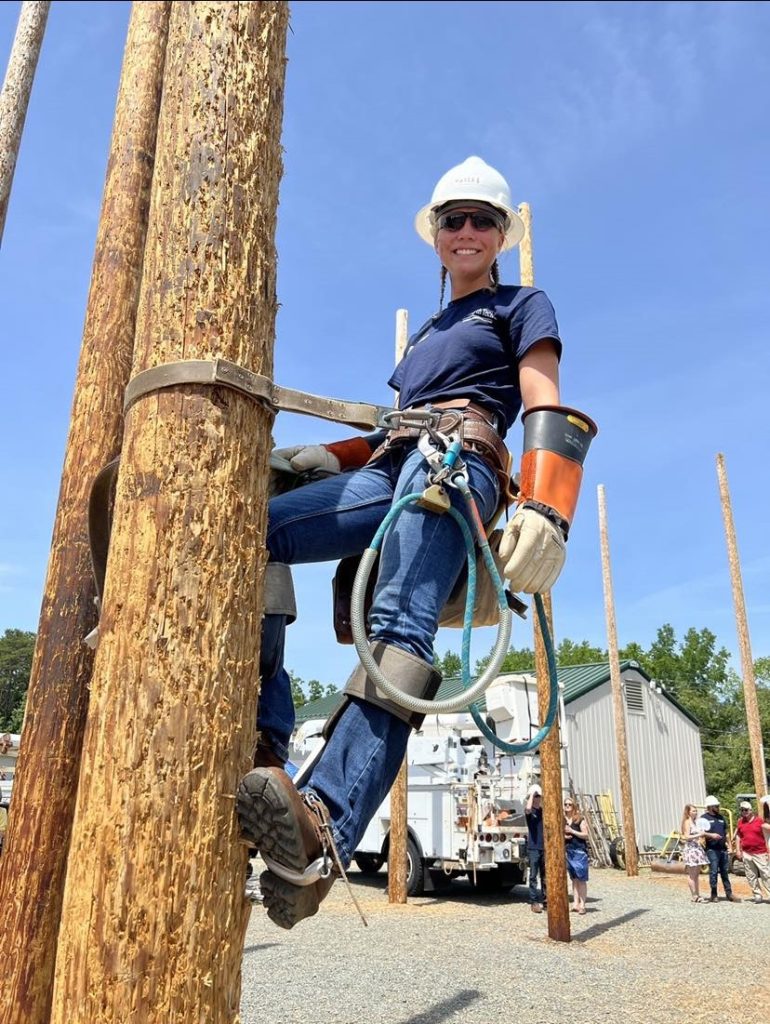
The workforce ecosystem is in a state of major flux with the increasing removal of college degree requirements by companies and government employers, a transition to skill-based hiring (certificates, micro-credentials, etc.), and the retirement of trade workers. Throw in mass layoffs in the technology sector and the rapid emergence of artificial intelligence, (A.I.) to make the labor market really complex and perplexing.
The feared catastrophic loss of “blue collar” or trades jobs to A.I. seems to have been misplaced. In fact, it’s “knowledge” or white-collar roles that are now most at risk of being replaced by artificial intelligence. Of all these workforce fluctuations, the scariest might just be the lack of people pursuing trades jobs. The significance of plumbers, electricians, carpenters and lineworkers (the folks who keep the lights on or restore them in stormy times) can’t be overstated.
As someone who has been immersed in the careers space for 20+ years, mainly in the higher education career preparation and employment landscape, the previously mentioned hiring requirement changes fascinate me. When I was a child, there was no question that I would attend college after high school. In fact, I am a first-generation college graduate. But I am also the only child of a blue-collar worker. My dad was a tank mechanic in the U.S. Army, then a machinist for such companies as Westinghouse and G.E. Mid-career, he took HVAC and electrical courses and eventually retired as an electrician and supervisor for the City of Columbus Department of Water. Perhaps if I had been a son, my post high-school education and training expectations would have been different (it was the 1980’s after all). It’s hard to say, but I ended up pursuing a college degree in education. I was a public school educator for four years before transitioning to software sales and marketing.
Jump ahead a generation, and my own expectations for my son (his dad’s too) were that, following high school, he would attend college then find a white-collar job. However, by 2019 or so, shifts were starting to emerge in the post high school career scene. News stories and articles about slumping college applications and rising demand for trades workers became more prevalent. So much so that we discussed with our son whether he had interest in pursuing training in a trade. Unsurprisingly, his answer was no, specifically because he had no direct exposure to any trade jobs. His grandfather (my dad) passed away when he was a young boy therefore, he had no opportunity to learn or practice any trade related activities. From his perspective, he had two options, pursue college as we had always planned, or join the U.S. Navy, from which his paternal grandfather had retired.
Ultimately, he chose the college route and is pursuing a Bachelor of Business Administration degree in marketing. As he wraps up his 1st senior year (he will be a 5-year senior thanks to COVID delays and complications his freshman year), it remains to be seen where he will land after graduation. He DID just swap out several electrical outlets in his college apartment. So who knows, maybe there IS a future in the trades down the road for him.?! There certainly is no lack of opportunity.
To find a young person currently working in the trades, I didn’t have to look far. Let me introduce you to my first cousin once removed, Haylee Glasgow. I recently had the chance to conduct an interview with Haylee to gain insights into her high school career readiness experience, her career exploration and decision-making process as well as her current role.
Q: Hey Haylee, please tell me a bit about your current role.
A: Hi. I’m an electrical lineman/lineworker and I work for Duke Energy Carolinas. I’ve been in the job for a year and a half.
Q:Is this an apprenticeship?
A: Yes, it is an apprenticeship that will lead to me becoming a journeyman in my trade
Q:What are the differences between a journey lineman and a lineman?
A: A lineman has multiple different steps to test and reach the ultimate goal of becoming a journeyman. A journeyman lineman is one that is highly skilled and trained on this specific trade and can do most work and figure out many tasks due to their experience in the trade.
Q: What kind of training or educational background was required for your lineman job?
A: There are no specific degrees or certifications you are required to acquire to be a lineman, but I went to a climbing school at my local community college Forsyth Tech in Winston-Salem, North Carolina.
Q: Why did you decide to attend climbing school at Forsyth Tech if there were no requirements to do so?
A: As a female I was nervous about getting into such a male dominated field, I wanted to test the waters and see if I was capable of the work before I applied and went through the hiring process.
Q: What’s a typical workday look like for you?
A: I normally get to work by 7. I put ice on my truck, get any wire or poles or other materials I need for that day. I sign on to my computer to see whether I have a job with a crew or trouble work where we will go respond to and fix issues. It often involves troubleshooting. For example, we often go to houses that aren’t getting the right voltages or to cut the power off due to house fires. If I’m with a crew, we will go out to change out broken power poles that have been hit by vehicles or to upgrade older equipment.
Q. When did you graduate from high school and from Forsyth?
A. I graduated high school on June 5th, 2021 and I graduated from Forsyth Tech June 2022 .
Q: What aspect of your work is the most challenging and what aspect(s) do you most enjoy?
A: The most challenging aspect of my job is learning how to deal with some of the more physical tasks. It’s also a challenge to prove myself to some of the guys I work with and to show them I’m capable of doing my job the same way they are.
Q. How do you address the most physical challenges? Do you do any strength training or have you had to come up with alternative ways or find tools to help you tackle some of the most strenuous physical parts of the work?
A. To deal with many of the most physical challenges, I normally have to take a step back and really think about how I’m going to tackle them. I listen and learn from a lot of the guys I work with who are small like me. They have come up with ways to overcome being slight or smaller. It’s actually more common than you would think for people to need to ask for help or find different ways to tackle a job. I also go to the gym 4-5 days a week to build and maintain strength.
Q. What aspect of your role do you most like?
A. One of my favorite parts of my job is using critical thinking and rigging skills as they are so important in my day to day.
Q: Why is that?
A. They help me overcome many challenges where I may need more leverage or to react fast. I love learning new ways to overcome challenges and prove myself and critical thinking and rigging helps me do those things. Even dealing with some physical limitations due to size as I mentioned before. Brain over brawn works very often.
Q: Can you share a bit about your childhood and adolescent exposure to different occupations and how it played a role in shaping your career interests?
A: My mom always worked hard at everything she did, and she never relied on anyone to hand her anything. If she wanted it, then she worked for it which taught me a lot about life and the woman I wanted to be. My mom is a control room specialist and also works mainly with males which helped me overcome my uncertainty about that part of my job. My dad has always worked outside whether it was in the oil fields, carpentry work or plumbing. He taught me a lot in my high school years and always told me I’m capable of anything I put my mind to. He never let me forget it, he inspired me to seek out a trade and helped me explore different options. I was blessed to have my parents’ support in everything leading up to me choosing this line of work.
Q: High school career readiness programs can vary from school to school, region to region, etc. Were there any specific initiatives or resources that you found particularly helpful in guiding your career choices?
A: There weren’t many trade options or job fairs at the high school I attended. It was up to me to find something I would like and to do my own research. I feel as if companies don’t reach out to the younger generation as much anymore, which is another reason I like working for Duke Energy. They make it a point to be a part of several job fairs at high school and colleges around my area and several other areas.
Q: Any advice for current high school students on how to make the most of career programs and job exploration opportunities?
A: Explore every opportunity you get. You never know what you might end up loving or wanting to do. Throughout middle school and high school, I wanted to be a physical therapist. When it came time to graduate, I was unsure if that was a career I was willing to go into college debt for or if I was willing to pour my time and energy into if I wasn’t truly in love with the job itself. You never know where an opportunity will take you and teach you. Reach out to your community colleges about trade opportunities it might change your outlook on things
Q: As a trailblazer in your field, what advice would you offer to other young women considering a career in the trades?
A: Jump in with both feet and give it your all. This isn’t something that will be easy, you will have to push yourself and challenge yourself every day but it’s well worth it. Try not to always think you will be pushed down, the people in the field with you will pick you up and teach you everything you will need to know.
Q: In your opinion, what steps can be taken to encourage more diversity in traditionally male-dominated professions like electrical line work?
A: Going to job fairs and making it a point to not only talk to young men that are interested in the job. Some young women may be too afraid to ask a grown man about such a male dominated career. Maybe having other females go with some of the guys to job fairs. The number of female trade workers now is expanding so if we make it easier to talk to women in specific trades, I’m sure that would encourage many young women to be more curious and comfortable exploring these roles.
Q: What message or encouragement would you like to share with young females aspiring to break stereotypes and pursue a fulfilling career in a non-traditional field like yours?
A: Don’t be afraid to be different, people are more accepting of women in trades and in leadership roles than ever. We have an opportunity a lot of the older generations haven’t had to be able to do whatever type of work we want and to oversee job sites and projects, take advantage of what’s given and grow to your full potential.
Q: What else – what didn’t I ask that would be good for any young person considering a career in the trades? Anything you wish that you had known or thought to consider when career planning?
A: When I first started, I assumed the guys would make me an outcast just because I was a woman. The guys I work with don’t care that I’m a woman, they care if I can and will do my job. To them it doesn’t matter whether it’s a woman in the bucket beside them, they just want someone who is competent and who will also watch their back.
AMY: Well Haylee, this has been so fun. Needless to say, our great big family is SUPER PROUD of your accomplishments! You are really paving the way for young people, and especially young women, to explore career options and to be confident in pursuing non-traditional pathways. All the best in your path to achieving journeyman lineman status. It’s onward and UPWARD for you and your career. We hope we have a chance to reconnect and catch up on your story down the line.
HAYLEE: I’d love that! Thanks so much for the opportunity to share my career story. I’d enjoy reconnecting at some point to provide an update.
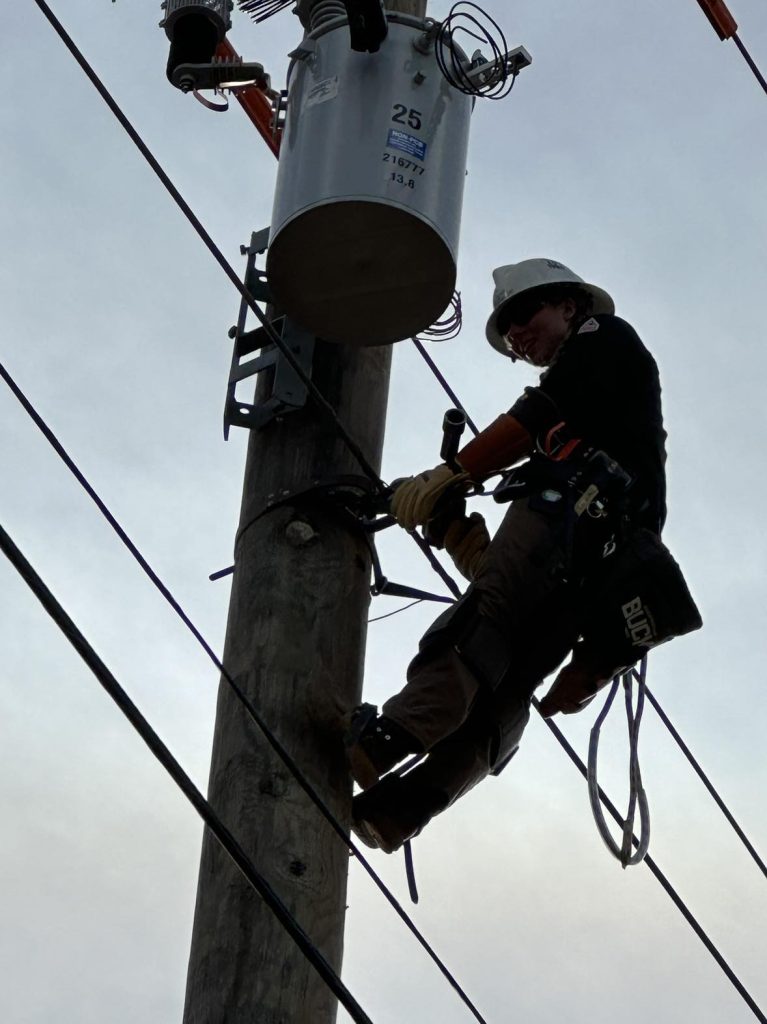
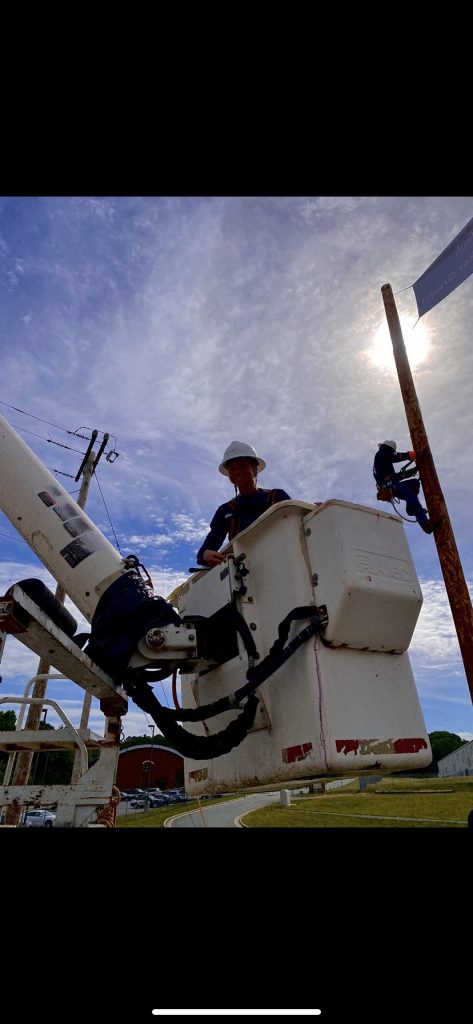
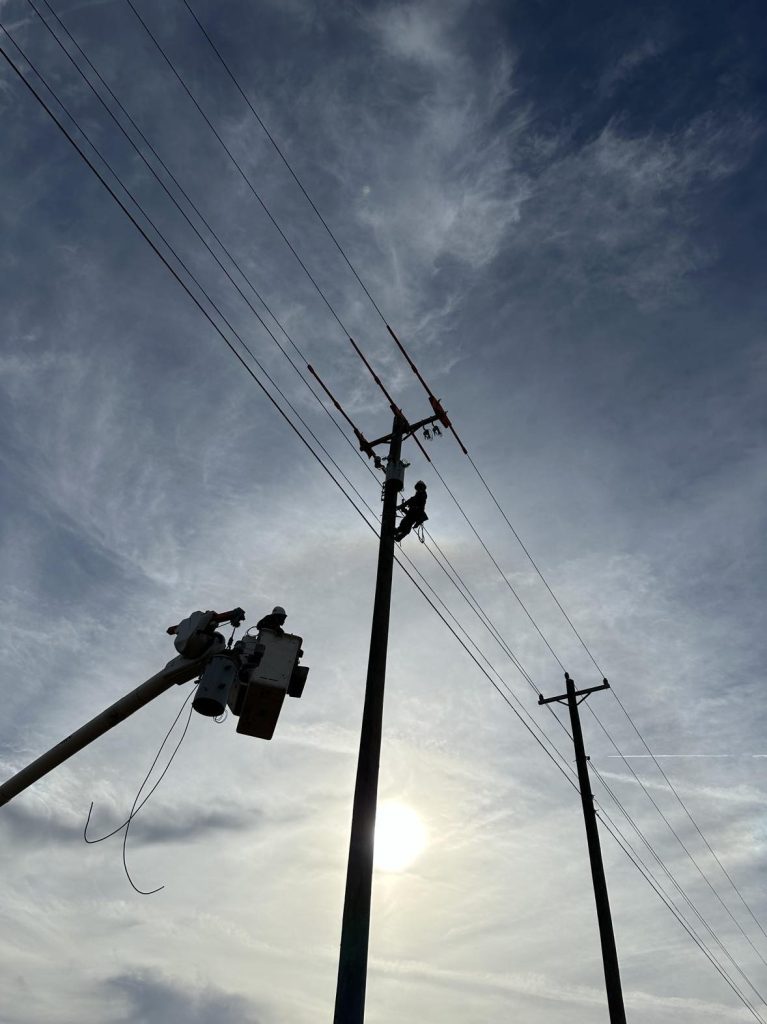
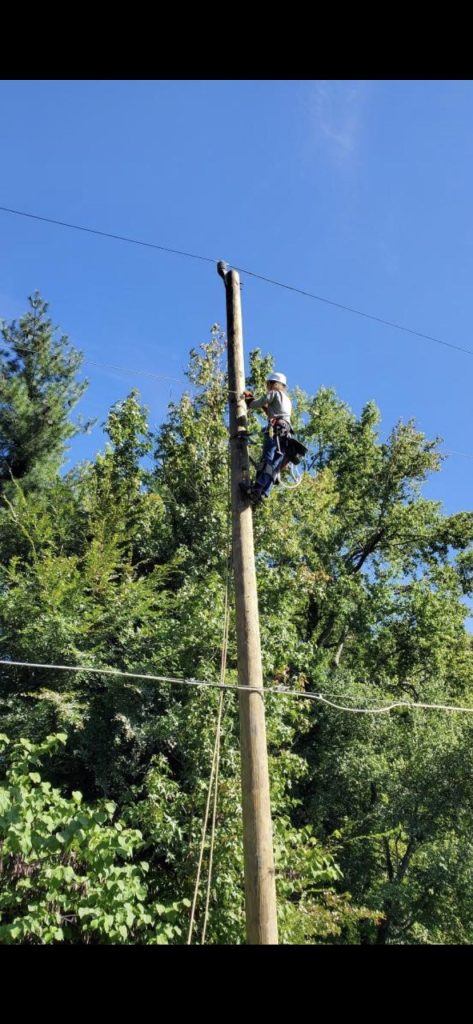
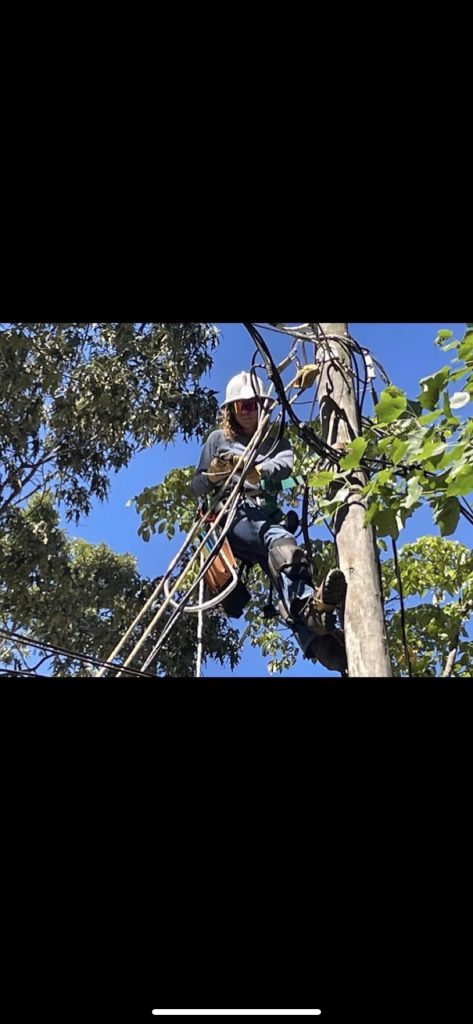
For anyone interested in exploring careers as a lineman or journey lineman, below are some resources to check out.
Occupational Outlook Handbook – U.S. Dept. of Labor
You can also explore available opportunities at Duke Energy at https://www.duke-energy.com/our-company/careers
Reach out to me at aking@gradleaders.com with any questions on this post or with ideas for future blog topics, guest blogger recommendations, etc.
